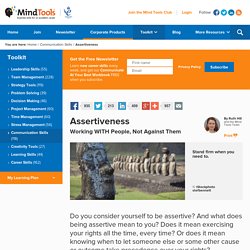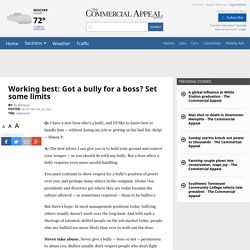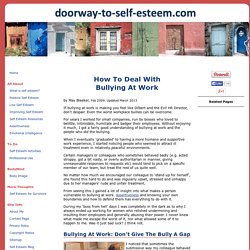

How To Be More Assertive At Work And In Life - Character Building. How to Make Difficult Conversations Easy: 7 Steps From a Clinical Psychologist. Someone is screaming in your face at the top of their lungs.

Or ranting angrily and you can’t get a word in edgewise. Or maybe they’re sobbing so hard you can barely understand what they’re saying. On How to Disagree. We live in a world saturated with disagreement.

People are at odds about pretty much everything from when to order a taxi, go out to dinner to whether there should be a caliphate; from the kind of orbit the International Space Station should assume; the right way to cook lasagna to whether Hungary is in Eastern or Central Europe, and how long a child should be allowed to play Minecraft on a Saturday morning. While disagreement can be civilised, interesting and productive, it is much too frequently a powerful source of misery: we get enraged and bewildered; we are appalled at the views of others and feel intensely bothered by them; we feel defeated, hopeless and lonely; we agonise, rehearse the conflict alone in our heads, worry, feel guilty, get upset… Disagreement is especially pressing now, because of certain large societal forces that have been building for the last couple of centuries. 1. Politics The developed world is now democratic. 2.
Assertive Behavior. An Assertive Communications Method. How to Be More Assertive for Better Communication. How to Say What You Really Mean at Work (and Be Heard) Managerial Courage. Aggression. The One Skill All Leaders Should Work On. If I had to pick one skill for the majority of leaders I work with to improve, it would be assertiveness.

Not because being assertive is such a wonderful trait in and of itself. Rather, because of its power to magnify so many other leadership strengths. Assertiveness gets a bad rap when people equate it with being pushy and annoying. But that shouldn’t stop you from learning to apply it productively (that is — in service to your strengths). More harm is done when people aren’t assertive enough than by being too assertive. Here are some specific ways in which assertiveness complements a wide range of the critical leadership skills you may already have: • Creating a culture of innovation: A couple of years ago I conducted a study to determine the characteristics of the most innovative leaders in one of the largest companies in the world. . • Being customer focused: We typically think of service or business development professionals as being good at, and focused on, building relationships.
Building Assertiveness Skills. If you are like many new supervisors, you got promoted because of your job knowledge and technical ability.

While some of you may have been recognized for your communication skills, others may find that your promotion requires a whole new level of expertise. Just recently, one new supervisor asked me quite openly, “Based on all your experience coaching supervisors and managers, what would you say is the one most important skill to possess?” Wanting to give my best answer, I thought about it for a few minutes, and then said, “Interpersonal communication skills.” I shared that out of all the statistics I’ve used in trainings, the message of this AMA quote has always remained with me: “90% of managers are fired, not because of their lack of technical competency or job knowledge, but for their lack of interpersonal skills.”
What exactly do we mean by communication? Though listening is critically important, I wanted to focus today on assertiveness. Assertiveness - Communication Skills Training From MindTools.com. Working WITH People, Not Against Them © iStockphotostefbennett Stand firm when you need to.

Do you consider yourself to be assertive? Your Assertive Rights. 13 Tips on How to Overcome Passivity. Edit Article.

Helping the Passive-Aggressive Executive - Manfred F. R. Kets de Vries. By Manfred F.

R. Kets de Vries | 10:00 AM February 20, 2014 Robert wondered why he was always so stressed out when he was dealing with Lucas, the latest addition to his team. On the face of it, the new hire seemed very agreeable and supportive, but whatever interactions he had had with him left him wondering about his true intentions. Learning to Speak Up When You're from a Culture of Deference - Andy Molinsky. By Andy Molinsky | 9:00 AM July 7, 2014 Many of us are uncomfortable speaking with people of higher status.

We can feel self-conscious, unsure of what to say, and afraid what we’re going to say — or what we’re saying — is the wrong thing. After these conversations, we often replay in our heads what we said, analyze what we shouldn’t have said, or realize what we should have said but didn’t. But imagine what communicating up the hierarchy is like for people from countries and cultures where notions of hierarchy are much deeper and much more ingrained than ours. Where even as a small child you are taught to speak only when spoken to, and that in the presence of authority figures, like your parents, your teachers, or your boss, you should remain quiet, put your head down, do solid work, and hope to be noticed.
The problem is a pervasive one. This same issue also manifests itself during the job search process. How to Say No Gracefully. 7 Tips for Setting Boundaries At Work. Working best: Got a bully for a boss? Set some limits. Q: I have a new boss who's a bully, and I'd like to know how to handle him -- without losing my job or getting on his bad list.

Help! -- Simon P. A: The best advice I can give you is to hold your ground and control your temper -- as you should do with any bully. But a boss who's a bully requires even more careful handling. You must continue to show respect for a bully's position of power over you, and perhaps many others in the company. But there's hope: In most management positions today, bullying others usually doesn't work over the long haul. Never take abuse. Bullying At Work Prevention Guide. By May Bleeker, Feb 2009.

Updated March 2013. Setting_boundaries_at_work.pdf. Setting boundaries Appropriately: Assertiveness Training - Psychological Self-Tools - Online Self-Help Book. Mark Dombeck, Ph.D. and Jolyn Wells-Moran, Ph.D. Assertiveness Training suggests that there are essentially three different ways that people can relate to one another. They can be: 1) aggressive, 2) passive or 3) assertive. Drawing Effective Personal Boundaries. How to Set Boundaries for Yourself and Your Employees - HR World.
By Scarlet Pruitt on February 11, 2008 As a boss, it can be tempting to treat employees like friends — to share office gossip and express your hopes and fears about the business. After all, you liked your employees enough to hire them. But too much friendliness can put employers in some sticky situations. Management Tip: Setting Expectations with Your Team. Setting expectations is one of the basic fundamentals of management; yet, many managers fail to do this very important step effectively.
Setting expectations first requires planning. The more time you invest on the front end, the more effective your team will be when it is in operations mode. The second component of setting expectations requires communication skills. People cannot read your mind, so to get your team on the same page as you, you must communicate your expectations clearly, in a way they can be heard, and often several times before they become internalized by others. Unless you are experienced and well-practiced, these actions may seem counter-intuitive at first.
Provide Structure Providing structure starts with defining a direction and setting clear boundaries. Workplace Boundaries Allow More Focus on Tasks and Abilities. Work is an important part of who we are. Success and happiness in life can be described as a true balance between Self, Family/Friends and Work. Satisfaction in how we see ourselves, satisfaction in the interaction we have with those close to us and satisfaction in the sense that we have a purpose in life. Workplace boundaries help build that sense of purpose by eliminating distractions and keeping the focus on completing each task to the best of our abilities. (Developing basic life skills can be very helpful in establishing workplace boundaries.) Work does not always mean a paid position. In general, interaction with those in the workplace (co-workers, supervisors, clients, customers) is more formal than interaction with family and friends.
Without clear boundaries, both co-workers and supervisors may confuse workplace relationships with personal relationships. This does not mean an employer should not expect a full day’s work from each employee.